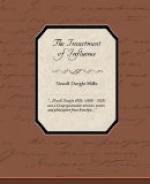To achieve these two principles, called liberty of thought and liberty of speech, some four thousand battles have been fought. In exchange, therefore, for one of these principles of freedom and happiness, society has paid—not cash down, but blood down; vital treasure for staining two thousand battle-fields. To-day the serf has entered into citizenship and the slave into freedom, but the pathway along which the slave and serf have moved has been over chasms filled with the bodies of patriots and hills that have been leveled by heroes’ hands. Why are the travelers through the forests dry and warm midst falling rains? Why are sailors upon all seas comfortable under their rubber coats? Warm are they and dry midst all storms, because for twenty years Goodyear, the discoverer of India rubber, was cold and wet and hungry, and at last, broken-hearted, died midst poverty.
Why is Italy cleansed of the plagues that devastated her cities a hundred years ago? Because John Howard sailed on an infected ship from Constantinople to Venice, that he might be put into a lazaretto and find out the clew to that awful mystery of the plague and stay its power. How has it come that the merchants of our western ports send ships laden with implements for the fields and conveniences for the house into the South Sea Islands? Because such men as Patteson, the pure-hearted, gallant boy of Eton College, gave up every prospect in England to labor amid the Pacific savages and twice plunged into the waters of the coral reefs, amid sharks and devil-fish and stinging jellies, to escape the flight of poisoned arrows of which the slightest graze meant horrible death, and in that high service died by the clubs of the very savages whom he had often risked his life to save—the memory of whose life did so smite the consciences of his murderers that they laid “the young martyr in an open boat, to float away over the bright blue waves, with his hands crossed, as if in prayer, and a palm branch on his breast.” And there, in the white light, he lies now, immortal forever.
And why did the representatives of five great nations come together to destroy the slave trade in Africa, and from every coast come the columns of light to journey toward the heart of the dark continent and rim all Africa around with little towns and villages that glow like lighthouses for civilization? Because one day Westminster Abbey was crowded with the great men of England, in the midst of whom stood two black men who had brought Livingstone’s body from the jungles of Africa. There, in the great Abbey, faithful Susi told of the hero who, worn thin as parchment through thirty attacks of the African fever, refused Stanley’s overtures, turned back toward Ulala, made his ninth attempt to discover the head-waters of the Nile and search out the secret lairs of the slave-dealers, only to die in the forest, with no white man near, no hand of sister or son to cool his fevered brow or close his glazing eyes.




